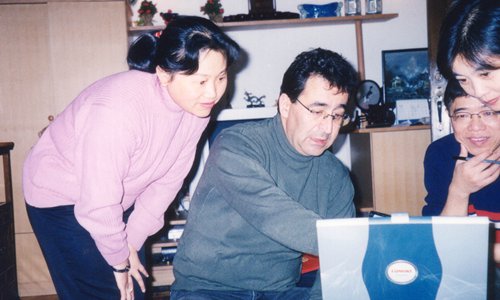More than 30 years ago, a young Turkish boy, among the first patch of Turkish students dispatched by their government, arrived in Beijing to learn Chinese and became the first Turk to receive a master's degree in China.
Noyan Rona, now became the one of the most famous foreigners in Shanghai. He is also a holder of Chinese green card, which is dubbed as "the world's-hardest-to-get" card.
"I like China. This is like my second home and I'm very happy to do something for my home," said Noyan, noting that it is also his responsibility to make China a better place.

Living in China for 35 years, he has been devoting himself to public service in Shanghai, be it in the public traffic industry, community service or nursing home.
"Once I was taking a taxi, after telling the driver where I was going, he recognized me," Noyan said in fluent Chinese.
Noyan used to be a traffic management volunteer and attended annual meetings to assess the Shanghai service industry.
He was also awarded as "honorary citizen of Shanghai" for his contributions in 2012, which he said is an honor he cherishes the most.
Noyan said he loves Shanghai because it is so modern that it gives everything you need and develops fast.
Long journey
Noyan started his Chinese journey in 1983 after he graduated from Ankara University.
He studied Chinese at Beijing Language and Culture University first and gained his master's degree in history at Wuhan University in Central China's Hubei Province.
"There weren't so many foreign students in Beijing at the early stage of reform and opening-up," he said.
Although he was relatively well-off with a scholarship from the Chinese government, Noyan spent some hard times back then.
"The electricity often went off. Hot water was available for only two days a week. The heater was on for two hours a day… we only took the bus and some even didn't have a bicycle."
He also said foreigners could not travel freely back then. "The Chinese government published the list of cities open to foreigners every month. If I travel from Beijing to Wuhan, I must have a permit."
China also adopted a dual currency system in the 1990s. Noyan said Chinese and foreigners stand in two different lines at KFC, and while the Chinese used the RMB, foreigners used a foreign exchange certificate.
Volunteer work
Despite all the hardship, Noyan decided to stay in China after graduation.
"I knew China was relatively poor and politically conservative back then, because I was attracted by the culture and language. Besides, I studied Chinese, I was not going to anywhere else," he said.
He worked at the Turkish Embassy in China, the Consulate General of Turkey in Shanghai, and now serves as a chief representative at Garanti Bank's Shanghai representative office.
The bank was the first Turkish bank to open a representative office in China after the reform and opening-up.
In Noyan's eye, Shanghai had the great potential to be the country's financial, industrial and service center. He said Shanghai's financial environment back in the 1990s was like a flower in the bud. With less and less restrictions on foreign capital, "Shanghai has become a real international financial center."
He also serves a guest professor at Shanghai University and Northwest University in Xi'an, Northwest China's Shaanxi Province, and shares his views on bilateral relations between China and Turkey with students.
Noyan is also keen on China's overall social and economic development. He reads several Chinese newspapers each day, including People's Daily and Shanghai Daily.
Due to his great contributions to China, Noyan was given a Chinese green card, which is not easy for foreigners to obtain.
From 2008 to 2014, only 7,356 foreigners were granted permanent residence cards, based on recommendations from ministries or provincial governments.
Statistics showed that some 600,000 foreigners live and worked in China, Xinhua reported in 2017.
Noyan said he has also become better-off with China's fast development in the past 40 years, saying that China has developed 400 times since the reform and opening-up.
"The past 40 years of reform and opening up have brought a lot of changes to China, and that's also the reason why I want to stay here — to experience the changes," he said.
"That's why after 40 years, we could have what we have today. (The achievement) has already surpassed human imagination, including foreigners and Chinese alike."

